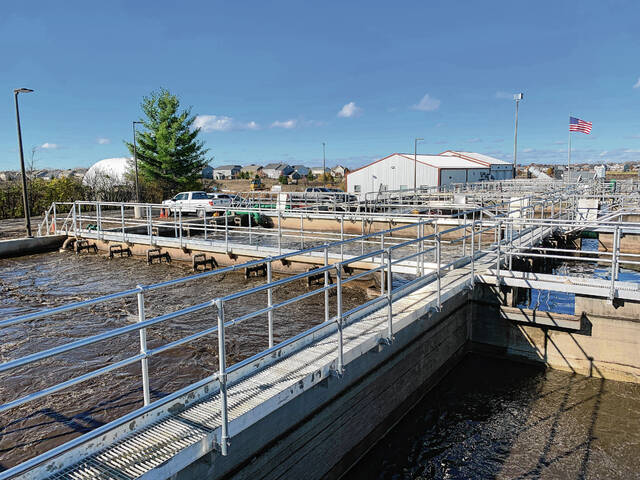
An expansion of McCordsville’s wastewater treatment plant recently completed, doubling its capacity to nearly 1 million gallons per day.
Mitchell Kirk | Daily Reporter
McCORDSVILLE — An expansion of the town’s wastewater treatment plant is substantially completed, doubling its capacity to nearly 1 million gallons per day.
At a cost of about $7.5 million, the project took over a year to complete and was executed to accommodate the town’s ongoing and upcoming growth.
Ron Crider, McCordsville’s public works commissioner, said there are still some minor issues to tackle, but the expansion is online. Construction started in August 2020.
The expansion consisted of more holding tanks and an improved process for wastewater flows coming in.
“We have better capacity and we have better treatment,” Crider said.
That treatment calls for a multi-step process in which the wastewater moves through a network of tanks. The steps include circulating air through the wastewater; bacteria consuming the waste; and screens separating sludge, explained Steve Gipson, McCordsville’s superintendent of wastewater operations.
“If you look at a wastewater treatment plant, it’s just like a human body,” Gipson said. “Your food intake will be processed, then you have to digest it, which is the same thing, same principle.”
The plant discharges treated water into a nearby ditch, through which the water flows west to Geist Reservoir. From April 1 through Oct. 31, state regulations require McCordsville’s plant to include a final treatment step of exposing the water to ultraviolet light for disinfection, due to the potential for people to use the reservoir for recreation during that time of year.
The project also included a new building for preparing the sludge left over from the treatment process. The sludge is mixed with a polymer to thicken it before it’s pumped into a special 30-cubic-yard bag in a bin that’s eventually disposed of in a landfill. The building currently holds two large bins and has room for more as activity picks up at the plant in the future.
McCordsville Town Council raised wastewater rates last year from $48 a month to $52.99 a month to help pay for the project. For an expansion of the plant before the most recent one, the town had enough funding from fees developers pay and no rate hike was necessary, Crider said.
“We had that money sitting in the bank, so my hat’s off to past councils for doing what they did, but this time there was such a large expansion that we had to raise the rates,” he added.
Rates remain far lower than the $80 per month they were when Crider and Gipson first started working for the town 20 years ago, however.
The recent wastewater treatment plant expansion is the fifth they’ve seen since 2001, when its capacity was 75,000 gallons a day for a town that had about 1,200 people and four-way stops instead of traffic lights.
Fast forward to the present, when estimates place the population closer to 8,000 and many monthly town council meetings include at least one presentation from a developer looking to build hundreds of homes.
“We’re hoping to maybe get 10 years out of this one,” Crider said of the current 1-million-gallon plant. “All these subdivisions aren’t going to pop up overnight; it’s going to take quite a few years to build out.”
The plant’s currently treating a little more than 500,000 gallons a day, leaving plenty of capacity left, he and Gipson said.
There’s no room left to expand the plant at its current site, however. The town has designated a spot nearby for its next wastewater treatment operation for when the current one approaches its limit, and officials estimate it will be capable of about 5 million gallons a day.
The expansion comes as other communities in the county also are expanding their wastewater facilities. Greenfield and New Palestine either are building or have finished expansions to their municipal sewer plants. Fortville is preparing to expand its water plant.




